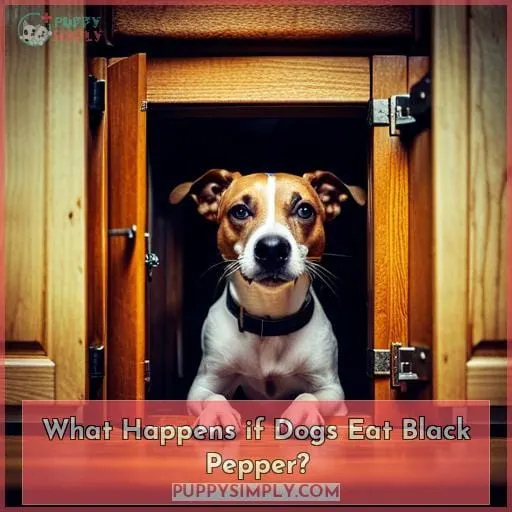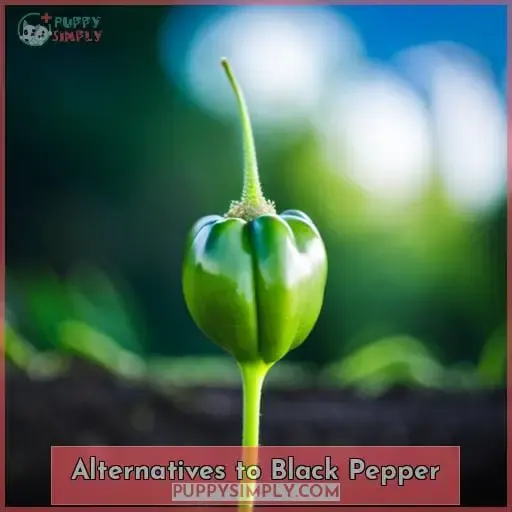This site is supported by our readers. We may earn a commission, at no cost to you, if you purchase through links.
Asking yourself the question Can dogs eat pepper seasoning? is a common concern for many pet owners. After all, we want to protect our pups and ensure that anything they consume won’t harm them in any way.
But what if the food or seasoning contains black pepper? While a small amount of black pepper is generally safe for dogs, large quantities can lead to potential health concerns like stomach upset and even breathing problems due to sneezing.
In this article, we’ll explore whether consuming black pepper can benefit your pup in any way.
You will also learn about alternative seasonings that are safe for your dog’s consumption so you don’t have to worry when sharing human foods with them!
Table Of Contents
Key Takeaways

- Dogs can consume small amounts of black pepper as part of a balanced diet, but large quantities can cause stomach upset and breathing problems.
- Other types of peppers, such as green peppercorns, cayenne, and hot peppers, should be avoided by dogs.
- Natural alternatives like fresh vegetables and unseasoned cooked chicken are safe options for providing variety in a dog’s diet.
- Treats should only make up 10% of a dog’s daily caloric intake.
Can Dogs Eat Black Pepper?
While black pepper offers no health benefits to your canine companion, it can be consumed in small quantities as part of a balanced diet. However, you should always adhere to dietary guidelines and practice food safety when feeding your pup.
Be mindful that some dogs may not enjoy the spicy flavor of black pepper or tolerate larger amounts well. Natural alternatives, such as fresh vegetables and unseasoned cooked chicken, are great options for providing variety without the risk of health risks associated with consuming too much black pepper or other types of peppers, such as green, pink, white peppercorns, and Sichuan cayenne peppers.
It’s important to remember that treats should only make up 10% at most of their daily caloric intake.
What Happens if Dogs Eat Black Pepper?
Transitioning from black pepper, it’s important to consider what happens if your pup consumes too much of the spice. Dogs are known for having sensitive stomachs and can easily experience digestive discomfort when consuming large amounts or quantities of black pepper.
Not only will the spice be difficult for them to process, but dogs may also have an intolerance or dislike its spicy flavor.
In addition, inhaling too much black pepper can cause sneezing and breathing problems in your pet as well.
It’s best to adhere closely to feeding guidelines that provide a balanced diet with just enough treats so that they make up no more than 10% of their daily caloric intake—and opt for little salt whenever possible! If you want to add some extra flavor into their meals without going overboard on spices like black pepper, then choose natural alternatives such as fresh vegetables and unseasoned cooked chicken instead.
Lastly, never feed dogs table scraps or heavily seasoned foods because this can lead not only to weight gain but also to unwanted behaviors. This is due to exceeding nutrient needs set out specifically tailored towards canine health requirements over time.
Potential Health Concerns
Greeting fellow pet owners! Are you wondering if it’s safe for your pup to consume pepper seasoning? It is important to be aware of potential health concerns that may arise if dogs eat this spice, including stomach upset, sneezing, and breathing problems.
Too much black pepper can cause serious discomfort in our beloved furry friends and should be avoided whenever possible. Watch for signs of distress after eating the seasoning as this could indicate an underlying issue with digestion or respiratory health.
Stomach Upset
If your pup has eaten too much pepper seasoning, watch for signs of stomach upset such as vomiting or diarrhea and contact a vet right away. Unregulated consumption of black pepper can lead to excessive salt intake, which is dangerous for dogs.
It can also lead to the ingestion of toxic additives found in peppercorn sauce that may be harmful. Dogs should never consume spicy peppers like Sichuan cayenne peppers. Good alternatives include fresh vegetables and unseasoned cooked chicken, which offer plenty of nutritional benefits while avoiding risks associated with eating large amounts or quantities.
Feeding guidelines provide a balanced diet with just enough treats so they make up no more than 10% of the daily caloric intake. It is also important to opt for little salt whenever possible. Keeping an eye on human food consumption is key to healthily regulating what our furry friends eat.
Sneezing and Breathing Problems
Inhaling too much black pepper can cause your pooch to sneeze uncontrollably and experience breathing difficulties. Too much salt intake from unregulated consumption of pepper seasoning can also be dangerous for dogs, as well as the ingestion of toxic additives found in peppercorn sauce.
To avoid such risks, opt for fresh vegetables and unseasoned cooked chicken instead. This offers plenty of nutritional benefits without any legal opinion against it! Don’t forget that treats should make up no more than 10% of their daily caloric intake.
This way, you’ll give them a sly treat while still keeping an eye on real health benefits.
Large quantities or excessive amounts are not recommended when feeding dogs with pepper seasoning, so keep watchful if signs start showing!
Does Black Pepper Offer Benefits?
Although black pepper may tantalize your taste buds, unfortunately it offers no health benefits to your four-legged friend. Frequent consumption of this spice can lead to potential health risks and should be limited in amounts.
It is also important to take into account the flavor preferences of our furry friends – they may not enjoy the spicy flavor of black pepper! Furthermore, there is little nutritional value in consuming large quantities or even small amounts, so it’s best avoided altogether when providing treats for dogs.
A good idea would be grilled chicken breast – a whole food that contains all necessary nutrients for them without any additional seasoning like black pepper or other spices such as green, pink, and white peppercorns, which offer little benefit anyway.
If you are tempted by adding a large amount of black pepper, keep an eye out for signs that could indicate stomach upset after eating, including vomiting or diarrhea.
Remember: moderation is key when considering what’s best for our canine companions – stick with unseasoned foods where possible, but if you must provide something exciting, throw some veggies into their bowl instead!
Can Dogs Have Salt and Pepper?
Continuing on from our discussion about black pepper, it’s important to consider the safety of salt and pepper in your dog’s diet. While a small amount of salt is okay for most dogs, too much can be dangerous and lead to dehydration or electrolyte imbalances.
Similarly, adding large amounts of black pepper can cause stomach upset for your pup.
It is also important to take into account any food allergies when feeding your four-legged friend. Peppercorn-encrusted steak might sound delicious but could have disastrous consequences if you don’t check with a vet first! Even if there aren’t known allergies present in your pet, you should still stick with moderation as their exercise needs may vary depending on breed or size.
This means some foods, which provide essential vitamins and minerals like fresh vegetables, should make up more than 90% of their daily intake instead.
If you’re concerned about making sure they get all the necessary nutrients without overdoing spicy seasoning like black pepper, then good quality commercial dog food will usually provide everything required.
Just watch out for added sugar content, which isn’t suitable even in small quantities! Remember, when introducing new things into their diet, start slow with only small amounts until understanding how it affects them before increasing quantity gradually.
Other Types of Pepper?
As a pet parent, it’s important to be aware of the types of pepper that are safe for your pup. From green and pink peppercorns to cayenne, hot pepper, and peppercorn sauce – there are plenty of options out there! But beware: some spices like lemon pepper can be toxic in large amounts.
It’s best to discuss all these possibilities with your veterinarian before introducing any new foods into your dog’s diet.
Green, Pink, White Peppercorns
Though they may not offer the same flavor as black pepper, green, pink, and white peppercorns can still spice up your pup’s mealtime with their subtle kick. Eating safely is key; consult a healthcare provider to discuss any potential health risks.
Nutrition benefits are minimal, but food alternatives such as unseasoned chicken and fresh vegetables should make up most of the diet instead.
When it comes to seasoning options, remember: moderation is best! Keep an eye on calorie intake when feeding table scraps too.
Cayenne Pepper
Cayenne pepper is an incredibly spicy seasoning that can be dangerous for your pup. To keep them safe, avoid it, as well as salty things like table scraps and extra treats that could lead to weight gain.
Unseasoned cooked chicken or good-quality commercial foods are better options than any spicy food with toxic additives, such as peppercorn sauce.
Hot Pepper
Hot pepper is not a good choice for your pup. It can be toxic in large amounts, and too much of its spicy taste could lead to weight gain, as well as potentially harmful effects. Avoid it, along with human snacks and doggy treats that contain toxic additives.
Peppercorn Sauce
Avoid feeding your pup peppercorn sauce, as it may contain toxic additives that can be harmful to their health. Offer alternatives such as unseasoned cooked chicken or commercial dog food to provide the necessary nutrients without the risk of added toxins.
Monitor serving sizes and avoid table scraps when giving treats, especially those containing black pepper, which offer no nutritional value or health benefits for dogs.
Lemon Pepper
Lemon pepper is a popular seasoning that can be dangerous for your pup in large amounts. Eating it safely requires using best judgment and monitoring their flavor preference. Consider alternatives with no nutritional value, like people foods or lots of black pepper, which may cause extreme cases of stomach upset.
Alternatives to Black Pepper
For a tasty and healthy treat for your pup, consider offering them fresh vegetables or unseasoned cooked chicken instead of black pepper seasoning.
For example, carrot sticks are crunchy treats that provide plenty of vitamins and minerals while being low in calories.
Commercial dog food is also an excellent source of nutrients for dogs but should be used as part of a balanced diet with table scraps kept to a minimum due to the potential salt intake from seasonings not suitable for pets.
Additionally, spicy peppers like Sichuan pepper and cayenne should always be avoided by pups due to the severity of their reaction when ingested; use best judgment when it comes time to season food before serving it up!
As always, remember: moderation is key – too much (or too little!) can lead to serious health problems down the line, so keep everything in balance by following recommended portion sizes accordingly.
Human Foods Safe for Dogs?
Though not all human foods are safe for your furry friend, there are certain options that can be enjoyed in moderation to provide a nutritious and delicious snack. It is important to maintain healthy feeding habits and make smart food choices when it comes to meeting their nutrition needs.
Unseasoned cooked chicken or fresh vegetables such as carrots, celery stalks, bell peppers, or zucchini slices are great alternatives with similar properties as black pepper but without the health risks.
When incorporating extra foods into their diet, remember they should comprise no more than 10% of his daily calorie allowance.
It’s easy to become a fan of table scraps, but they often contain too much salt, which can lead to potentially dangerous consequences – just like over-consuming any type of spice seasoning, including black pepper powder.
Frequently Asked Questions (FAQs)
Are any spices safe for dogs to consume?
Yes, some spices are safe for dogs to consume in small amounts. Choose herbs and spices that do not contain salt or added sugars, such as parsley and oregano. Avoid spicy peppers like Sichuan and cayenne pepper, as well as peppercorn sauce, which may have toxic additives.
What should I do if my dog consumes black pepper?
If your dog has consumed black pepper, monitor them for signs of discomfort and contact your vet if they experience vomiting or diarrhea. Provide plenty of fresh water to flush out the pepper and offer unseasoned vegetables or cooked chicken as alternatives.
Is there any way to make pepper safe for my dog?
You can make pepper safe for your dog by feeding them only small amounts of black pepper. Watch for signs of stomach upset if they consume too much and avoid spicy peppers like Sichuan or cayenne. Provide alternatives such as fresh vegetables or unseasoned chicken to ensure their diet is balanced with no harmful additives.
What are some signs of stomach upset in dogs?
Signs of stomach upset in dogs may include vomiting, diarrhea, loss of appetite, bloating, or gas. They may also become lethargic and have difficulty keeping food down. If your dog displays any of these symptoms after consuming pepper seasoning, it is important to contact a veterinarian for advice.
How much pepper seasoning is too much for my dog?
Too much pepper seasoning can be harmful to your dog. Monitor them for signs of stomach upset, such as vomiting or diarrhea. Avoid feeding them heavily seasoned food and stick to small doses of black pepper in treats that make up less than 10% of their diet.
Conclusion
Your canine friend relies on you to keep them safe and healthy. When it comes to food, it’s important to know what is safe for them to eat and what isn’t. Although black pepper is not part of a dog’s natural diet, they can tolerate small amounts of it.
However, too much pepper can lead to stomach upset, sneezing, breathing problems, and other health issues.
As an alternative, you can offer your dog fresh vegetables or unseasoned, cooked chicken. Be sure to regulate their diet and avoid feeding them table scraps and heavily seasoned food. Offer your pup the best nutrition possible by providing them with good-quality commercial dog food.
By taking these simple steps, you can ensure your pup stays happy, healthy, and safe.














